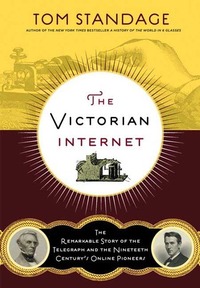Take a photo of a barcode or cover
108 reviews for:
The Victorian Internet: The Remarkable Story of the Telegraph and the Nineteenth Century's On-Line Pioneers
Tom Standage
108 reviews for:
The Victorian Internet: The Remarkable Story of the Telegraph and the Nineteenth Century's On-Line Pioneers
Tom Standage
Another shallow, quick, interesting read. I enjoyed this light history of the telegraph, and there certainly were interesting parallels with the Internet. However, there also seemed to be several gaps in the narrative.
For the most part, I liked how Standage simplified his description of the development and evolution of telegraphy. The early pre-electric history and problem-solving stories were particularly interesting. But with all the detail put into explaining some solutions, it was frustrating when he didn't do the same with others. For example, there were only a couple of sentences briefly mentioning how the problem of sending over great distances was resolved.
Overall, I'd still recommend it for anyone interested in communication in this time period. Like the other Standage book I've read, [b:A History of the World in 6 Glasses|3872|A History of the World in 6 Glasses|Tom Standage|http://photo.goodreads.com/books/1165367092s/3872.jpg|7600], it is a great starting place likely to whet your appetite for a more in-depth book.
For the most part, I liked how Standage simplified his description of the development and evolution of telegraphy. The early pre-electric history and problem-solving stories were particularly interesting. But with all the detail put into explaining some solutions, it was frustrating when he didn't do the same with others. For example, there were only a couple of sentences briefly mentioning how the problem of sending over great distances was resolved.
Overall, I'd still recommend it for anyone interested in communication in this time period. Like the other Standage book I've read, [b:A History of the World in 6 Glasses|3872|A History of the World in 6 Glasses|Tom Standage|http://photo.goodreads.com/books/1165367092s/3872.jpg|7600], it is a great starting place likely to whet your appetite for a more in-depth book.
I expected the title to be hype but was pleasantly surprised by this book. The first online dating, marriage all took place over the telegraph. First online crime took place over the telegraph. When it was first built it was expected to usher in a lasting world peace as governments could instantly communicate with each other. This book is well worth the time to read.
informative
fast-paced
informative
lighthearted
reflective
relaxing
medium-paced
Very interesting. Nice anecdote on how hard it was to prove that the telegraph actually worked.
What a surprisingly fun historical account of the development, uses, and effects of the telegraph. Standage strung together an interesting narrative which made for an enjoyable and easy (non-academic/jargony/theoretical) read. It's great for anyone looking for an overview of the telegraph or a starting place for understanding the social developments/effects.
It really is amazing how much the development, uses, users, effects, and discourses of the telegraph parallel the internet. Everything from romances, to hackers, to concerns of privacy, to changing business practices, to issues of addiction/dependency, to the spread of news, gossip, and political information is eerily and strikingly similar. As a media scholar I already knew this, yet for some reason media scholarship so often uses the phone and letter writing as the precursors to the internet (with a mere, yea yea and the telegraph). Really we would all benefit from remembering the subcultures, discourses, effects, hype, users, social norms, etc. of the telegraph. Great read, quick, fun, informative, and all around enjoyable.
It really is amazing how much the development, uses, users, effects, and discourses of the telegraph parallel the internet. Everything from romances, to hackers, to concerns of privacy, to changing business practices, to issues of addiction/dependency, to the spread of news, gossip, and political information is eerily and strikingly similar. As a media scholar I already knew this, yet for some reason media scholarship so often uses the phone and letter writing as the precursors to the internet (with a mere, yea yea and the telegraph). Really we would all benefit from remembering the subcultures, discourses, effects, hype, users, social norms, etc. of the telegraph. Great read, quick, fun, informative, and all around enjoyable.
This is the first book I've read for the web class I'm taking. It is a fascinating look at the first worldwide network.
3.5 stars. Standage's solid ability to tell stories and provide the appropriate level of detail makes his book about the telegraph breezy but informative. I'm amazed how a short-lived (30 years) technology led to the use of abbreviations (e.g., "I I" = I am ready; "S F D" = Stop for dinner; "1" = Wait a moment), the creation of AP and Reuters news agencies, and the propagation of bad poetry, such as this one celebrating the laying of first transatlantic cable:
'Tis done! The angry sea consents,
the nations stand no more apart;
with clasped hands the continents,
feel the throbbing of each other's hearts.
Speed, speed the cable, let it run,
a loving girdle round the earth,
till all the nations neath the sun
shall be as brothers of one hearth.
Well, this was a mostly interesting book about the telegraph. Which was a pretty fascinating invention. I'm not sure I needed to know 250 pages worth, but I read this for Book Riot's Read Harder Challenge. It was interesting, but well... you know.
It did give me a rad idea for a book about telegraph operators, if I ever decide I want to do all the research that would be involved in that.
I am aware that this is a useless review.
It did give me a rad idea for a book about telegraph operators, if I ever decide I want to do all the research that would be involved in that.
I am aware that this is a useless review.
informative
medium-paced





